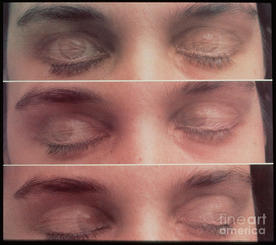 This picture shows eye movements during REM sleep
This picture shows eye movements during REM sleep
Sleep is fascinating thing when you think about it. We do it hopefully every night, even without thinking, it is part of our daily lifestyle. From when we were just small infants, sleep has been considered the go to solution for the flu or headaches. How did it become this way? What is so important about sleep?Some say that sleep is a chance for the body to recuperate, and to heal and rest after a long day's worth of activities. However, research has actually shown that sleep saves only about 50kCal during an eight hour period, which is evidently the same amount of energy in a piece of toast. However, regardless sleep is a fundamental human necessity because it is responsible in maintaining normal levels of cognitive skills which include things like speech, memory, and creative thinking. So what actually happens inside our brain, in our bodies when we sleep?
The Process of Sleep:
Sleep occurs in a recurring cycle of 90 to 110 minutes and is divided into two categories called non-REM and REM sleep.
Non-REM sleep:
Stage 1: Light Sleep
- During this stage, we are in a sort of limbo between being awake and being asleep. Our muscle activity slows down and even some twitching may be evident. When in the first stage of non REM sleep, we can be easily awakened.
Stage 2: True Sleep
- 10 minutes into light sleep, we begin to enter stage 2 or true sleep. Stage 2 lasts about 20 minutes, and the breathing pattern and heart rate begin to slow down. The body temperature drops which is why many people prefer sleeping a cool room. This is probably the largest part of deep sleep as it encompasses 40-50% of sleep.
Stage 3 and 4: Delta Sleep
- Stage three is when the brain begins to produce delta waves which is large or high amplitude and slow which is low frequency. Breathing and heart rates are at their lowest during this stage.
- Stage four is when breathing is at a steady rhythm and there is no much muscle activity. This stage is the deepest stage and is when we can experience night terrors, dreams, sleep walking or talking.
- Delta sleep is also the stage in which the body heals itself, for example tissue growth and repair occurs. Hormones are also released such as the growth hormone, which is essential for growth and development. Therefore, if we are awakened during this time, we often feel groggy and disoriented.
Restorative Properties:
In studies, animals that were deprived of sleep lost all immune function and die in just a couple of weeks. When we are awake, the brain has neurons that produce adenosine which is our brain's way of telling us that we are tired. Sleep deprivation allows for a build up of adenosine in the brain and pushes for the drive to sleep. However, when we are asleep, our body has the chance to flush out the adenosine and when we wake up, we can feel more alert and awake.
REM sleep:
REM sleep or the first rapid eye movement period starts after about 70 to 90 minutes after we fall asleep. We usually should have three to five REM episodes a night. Even though we are not conscious, our brains are working. REM sleep can also be called the dream stage because this is when most dreams occur. Our eyes dart around, our breathing rate and blood pressure rise. Usually, our bodies are paralyzed which is Nature's way of stopping you from acting out.
Circadian Rhythm:
Although many people believe that the solution to getting more sleep is simply to just go to bed earlier, however that can be disproven quite easily because of something called the circadian rhythm. In teens, there is a shift in when they feel tired, this is called the sleep phase delay. When teens are undergoing puberty, there is a shift in the timing of the circadian rhythm. When students are progressing through puberty, they experience a change in their circadian rhythm. As a result that while they used to be able to fall asleep at 9:00 or 9:30, now they have trouble doing so until about 11:00. This means that they may finish homework at 10:30, but students will lay in bed trying to fall asleep for half an hour. If the school start time was pushed back and a student finished homework at say, 11:00, they will be able to fall asleep immediately and be more rested. If teens try to resist this change which many of them do, it makes this time transition much harder. They hurt themselves staying up late to finish homework or studying for tests. The use of caffeine or nicotine is even worse, it hurts their bodies even more. Teens are worn out by lack of sleep at the end of the week, and they think that binge sleeping on the weekends will help. Actually, binge sleeping that supposedly can help you catch up, is actually even worse because it throws their body clocks off even more.
So what happens when you don't get enough sleep? How do our bodies respond to our cycles being broken?

